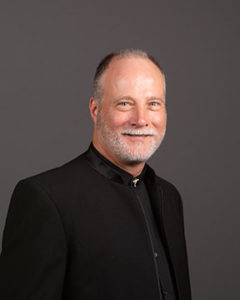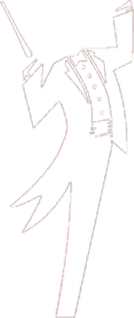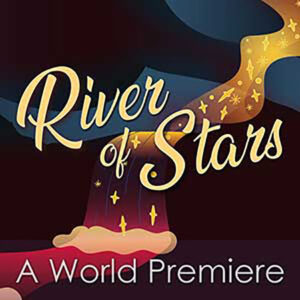Concert I
Thursday, October 7, 2021
River of Stars: A world premier
Concert 7:30 p.m.
The fiery exhilaration, anticipation, opportunity, and celebration of a World Premiere
Sponsored by Chris Cheever
Program
Ludwig van Beethoven – Symphony No. 5 in C Minor, Allegro con brio
Manuel De Falla – The Three Cornered Hat, Suite 1
Ethan Wickman – River of Stars (World Premiere) [Hear 2:44 preview]
Sergei Rachmaninoff – Rhapsody on a Theme of Paganini
Donald Crandall, piano solo
PROGRAM NOTES: Concert #1: River of Stars
Ludwig van Beethoven–Symphony No. 5 in C Minor, Allegro con brio
That most fiery, driven musical genius, the 250th anniversary of whose birth we were delayed in presenting by pandemic, will open our 21ist concert season. Beethoven is regarded as the musical bridge between the classical era of Haydn and Mozart and the Romanticism of the 19th century. Indeed, it is said that his father taught him rigorously in the hope that he would be a child prodigy like Mozart, and later Beethoven studied with Haydn. But his musical genius was slave to neither!
Beethoven composed nine symphonies, five piano concertos, 32 piano sonatas, two masses, a single opera, sixteen string quartets and many other works in his career. Sadly, the deafness which was total in his last years began to come on him before he was thirty, but it failed to stem his creative powers. As a symphonist, Beethoven is credited with expanding the symphony’s size and orchestration, as well as its harmonics and the overall musical coherence of the form. To listen to his symphonies in sequence, from the early first to the grand choral ninth, is to appreciate how Beethoven expanded symphonic language.
No four notes in classical music—perhaps in music of any sort—are more familiar than the famous opening of the fifth symphony, the so-called “Fate knocking at the door” sequence. “Dot-dot-dot-dash” became, because it was later the Morse code sign for the letter “V,” used by the Allies in World War II to represent Victory. Characteristically, Beethoven develops that rhythmic pattern in diverse ways through all four of the symphony’s movements. The first movement is being performed both in celebration of Beethoven and as an expression of the Symphony of the Hills’ embracing of the beginning of its next twenty years!
Manuel de Falla–The Three Cornered Hat, Suite 1
A highly esteemed, though never prolific composer, Manuel de Falla (1876-1946) is associated with the ballet and opera. His musical education was solid, his skill as a pianist awarded, and his love of that art competed with a passion for literature and journalism. Falla spent years in Madrid, Paris, and Granada, an associate of composers such as Debussy, Ravel, Dukas and Stravinsky. Upon the victory of Franco over the Republican forces, he left Spain for Argentina, never to return.
The Three-Cornered Hat, the ballet El Amor Brujo, and Nights in the Gardens of Andalusia (piano and orchestra) are probably the most familiar of Falla’s works. All of them draw on the culture and music of Falla’s home region of Andalusia, that most Southern region of Spain, whose history is a blend of its Arabic past as well as its Spanish present. Hat is based on a story of young newlyweds and the magistrate who seeks to seduce her. In the 1930’s, it was redone in a Broadway musical by Dietz and Schwarz that introduced the song You and the Night and the Music.
Ethan Wickman–River of Stars (World Premiere)
Your Symphony of the Hills and Conductor Gene Dowdy believed that its 20th anniversary called for an original creative statement. The year’s delay in offering that premiere only heightens our excitement. To that end, we commissioned composer Ethan Wickman (b. 1973) of San Antonio to compose an original work for our opening concert. Wickman, a Utah native, holds degrees in music from Brigham Young (BM), Boston University (MM) and Cincinnati College-Conservatory of Music (DMA) and is currently associate professor of music at UTSA.
Mr. Wickman has composed broadly in both secular and sacred forms, for symphonic ensembles large and small, solo instrument and voice. His Let the Word Go Forth, incorporating elements of John Kennedy’s speeches for orchestra and chorus, was presented at the Kennedy Center. Wickman put words from John Philip Santos and Carmen Tafolla to music in Ballad of the Borderlands, a cantata celebrating the history of our region.
Wickman’s works have been performed and acclaimed internationally. Tones that range from the lush to the intense, capturing a wide range of experience and feeling, characterize his music, which is also possessed of a deep spirituality. The Symphony is delighted to celebrate the World Premiere of an Ethan Wickman creation to commemorate its 20th anniversary and to symbolize its confidence in the power of symphonic music to speak to the human soul. As Wickman says, rivers, reflecting the stars above, inherently give us a vision “of things as they are and also of things as we would wish them to be.”
Sergei Rachmaninoff–Rhapsody on a Theme of Paganini
-Donald Crandall, piano solo
Sergei Rachmaninoff (1873-1943) bridges the 19th and 20th centuries. His musical language was quintessentially Russian—brooding, passionate and often melancholy. Amid the many forms of musical experimentation of the 20th century, Rachmaninoff remained a consistent practitioner of a late Romantic sensibility. A concert pianist, at 6 feet 6 inches he was an imposing figure on the stage. As a composer, he remains memorable for his compelling melodies.
Rachmaninoff’s career as a composer had a rocky beginning. The negative reception of his first symphony in 1897 led to four years of depression, a period broken by the enthusiastic response to his second piano concerto. He became deeply involved with the Bolshoi Ballet, often as a performer. After the Russian Revolution, the Rachmaninoff family emigrated to America, where he spent the remainder of his life, becoming an American citizen shortly before his death.
It was in America that he composed the Rhapsody on a Theme of Paganini, performing the work himself with the Philadelphia Orchestra in 1934. Paganini, the virtuoso violinist of the early 19th century, composed 24 Caprices The final caprice in A minor, with its 11 variations, has attractive musicians since its appearance. Its melody, challenging for the violinist, has been employed in virtually every musical idiom. Liszt and Brahms composed their own sets of variations, and in our time Benny Goodman and Andrew Lloyd Webber, among others, have provided versions. Rachmaninoff’s Rhapsody offers dazzling expressions of the theme from lively dance to romantic interlude. In this concert, Symphony of the Hills pianist Dr. Don Crandall recapitulates his performance from over a decade ago.
 From the conductor:
From the conductor:
The opening concert of the season, themed “River of Stars” should have the intention of fiery exhilaration, anticipation, opportunity, and mystery. Beethoven’s “fate knocking at the door” of his most famous work opens the performance. Composers write fiery works to express several ideas within one work, in this case, we find all these feelings within one concert. Spanish composer Manuel De Falla wrote the intensely folkloric and passionate Three-Cornered Hat as a celebration of Spanish Dance techniques in lieu of the standard classical ballet. Following the De Falla, we offer to all of humanity a world premiere orchestral work commissioned by the symphony in celebration of our 20 seasons. Internationally celebrated composer Dr. Ethan Wickman has created a new symphonic work that will be performed for the very first time on this concert. The piece will forever carry the name of the Symphony of the Hills. We bring back Dr. Don Crandall to play one of the great Romantic composers, Rachmaninoff, for his Rhapsody on a Theme of Paganini, another firebrand of talent, passion, and energy.
We would be honored by your presence at our opening concert of this new season!
Gene Dowdy, conductor & artistic director


